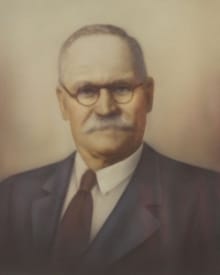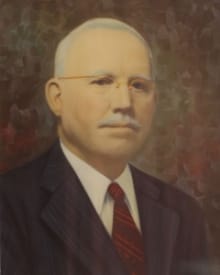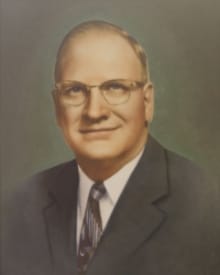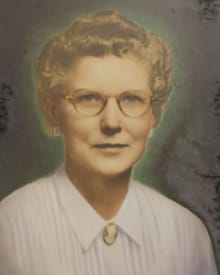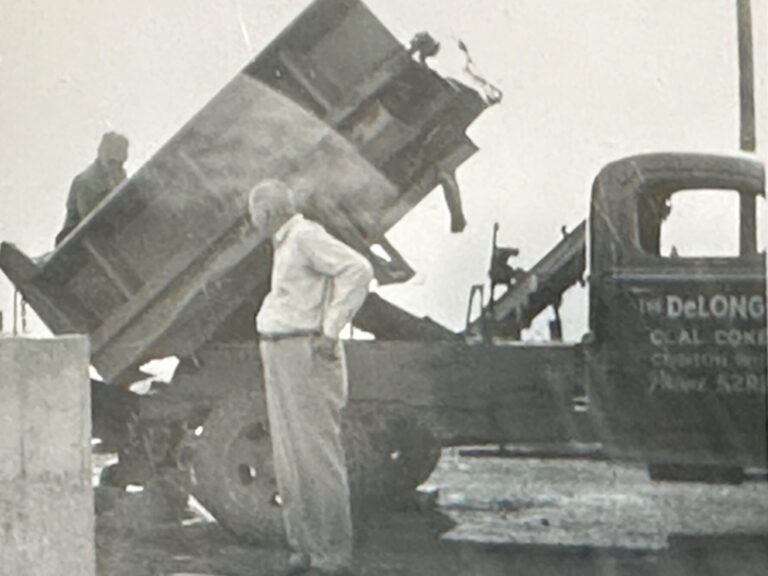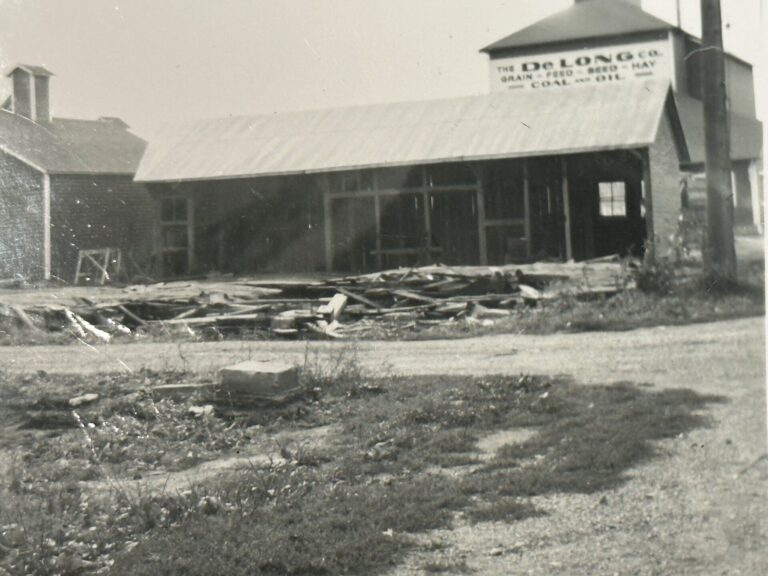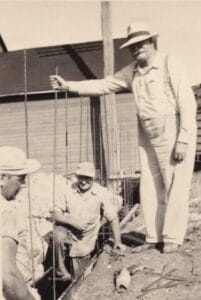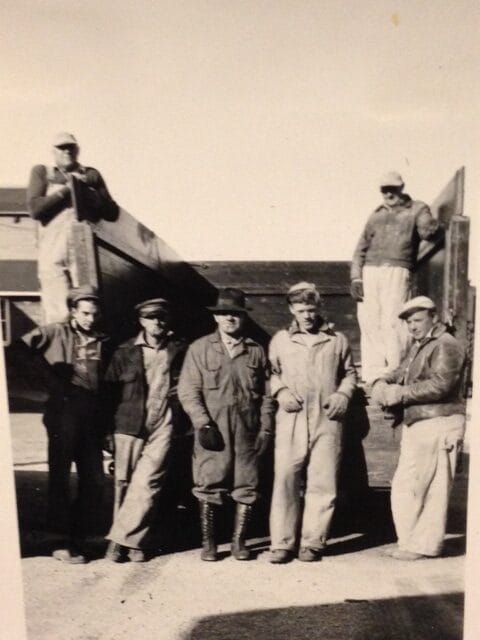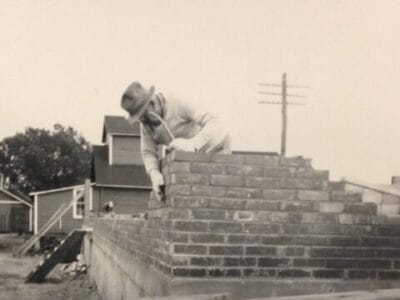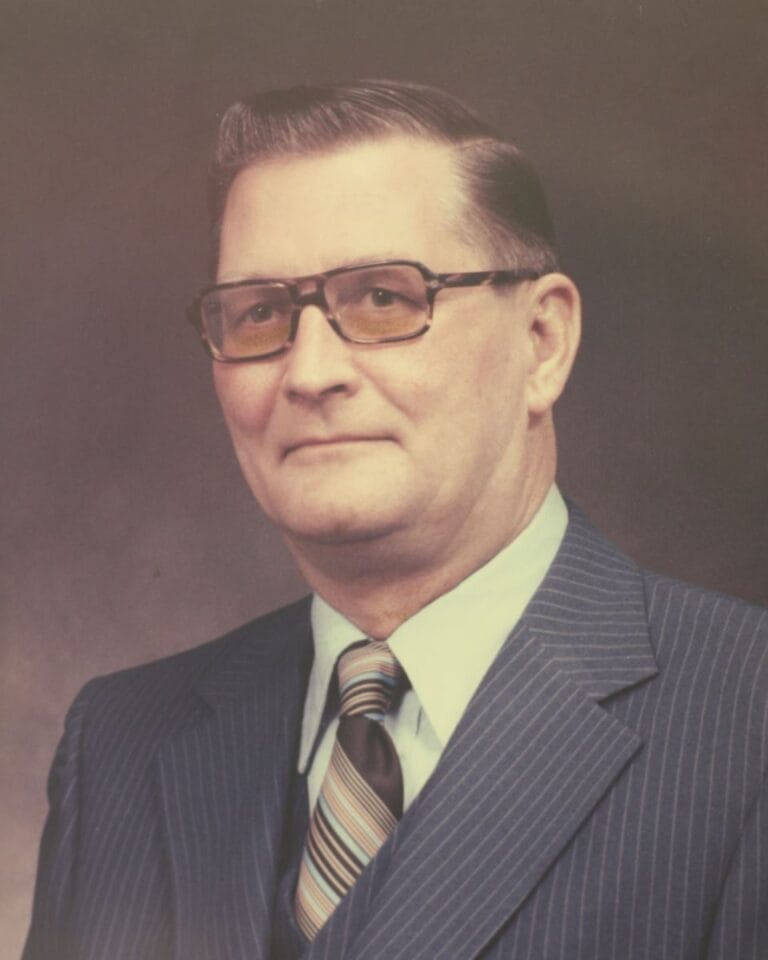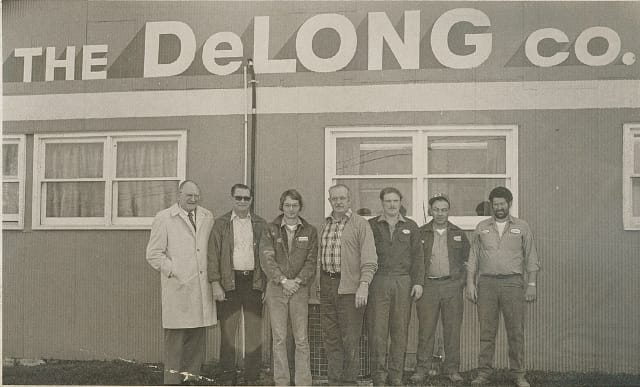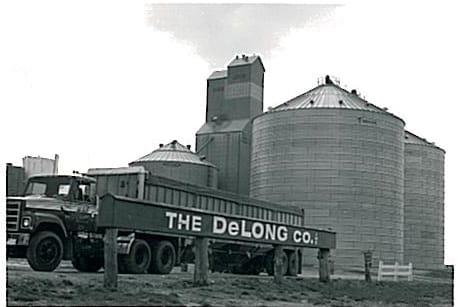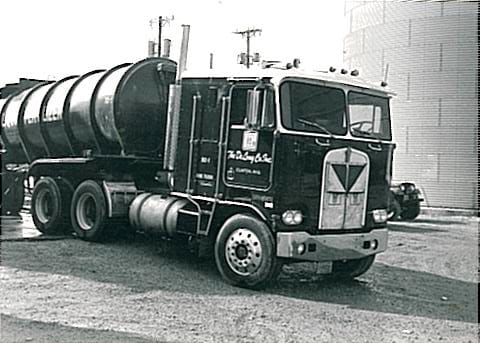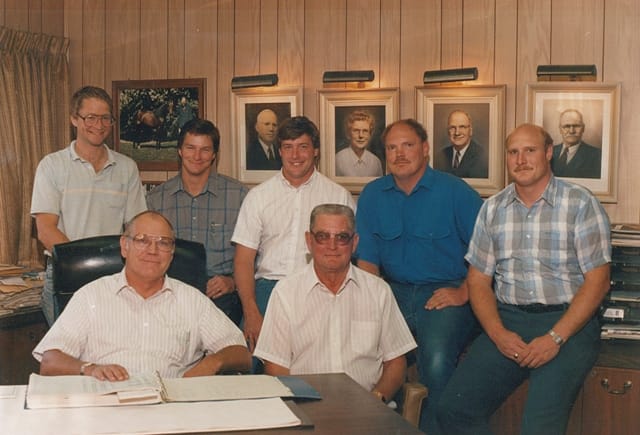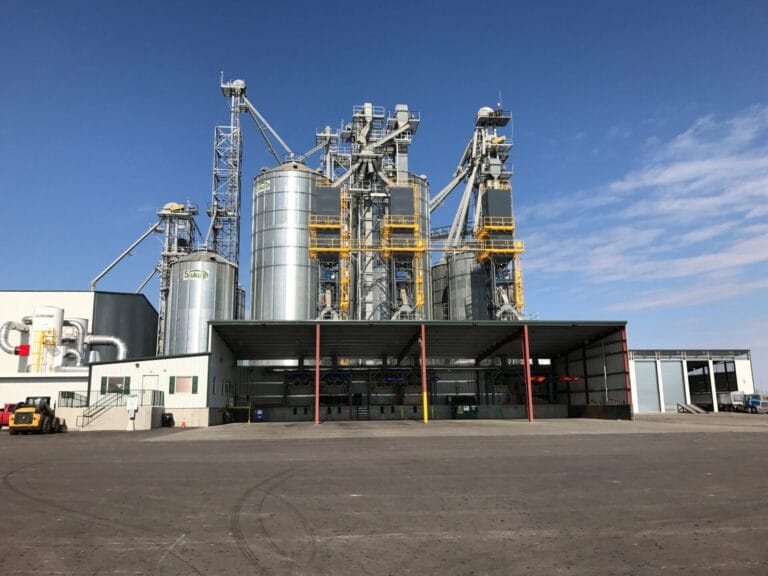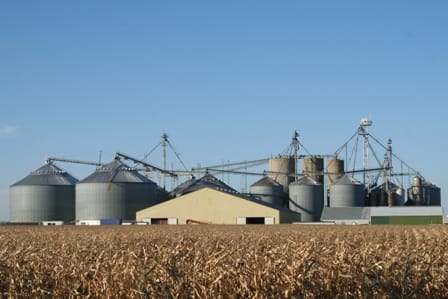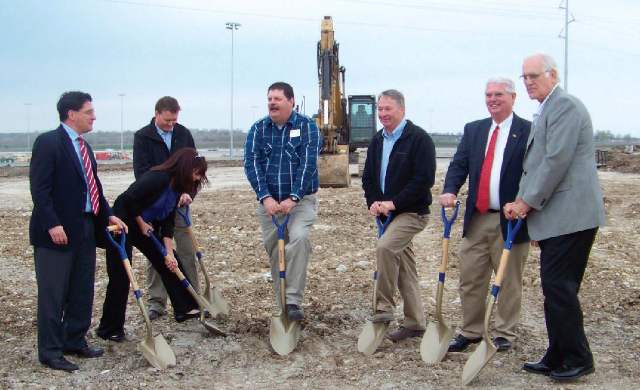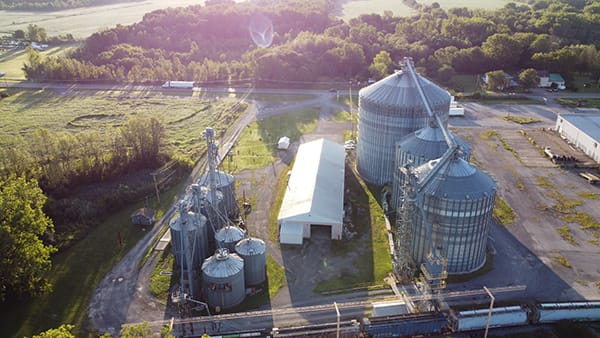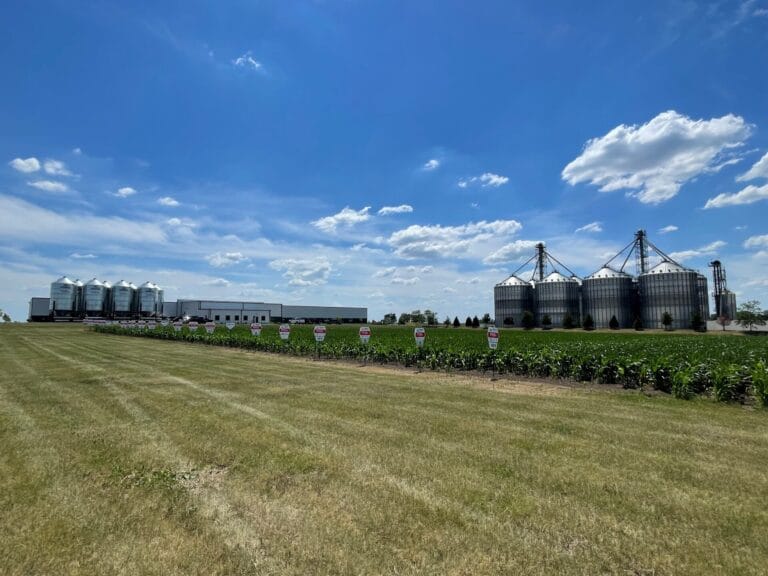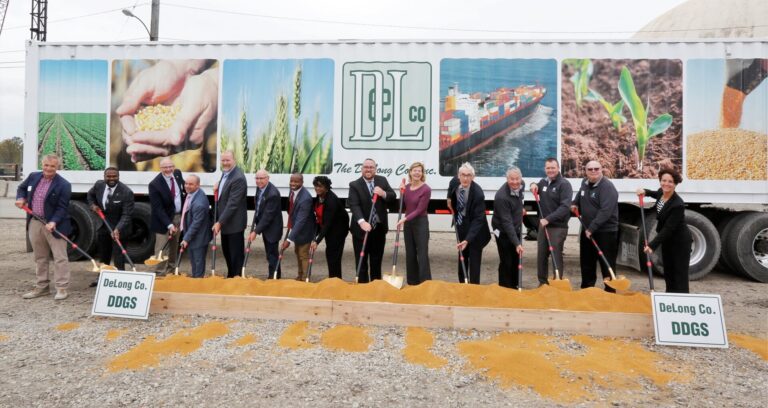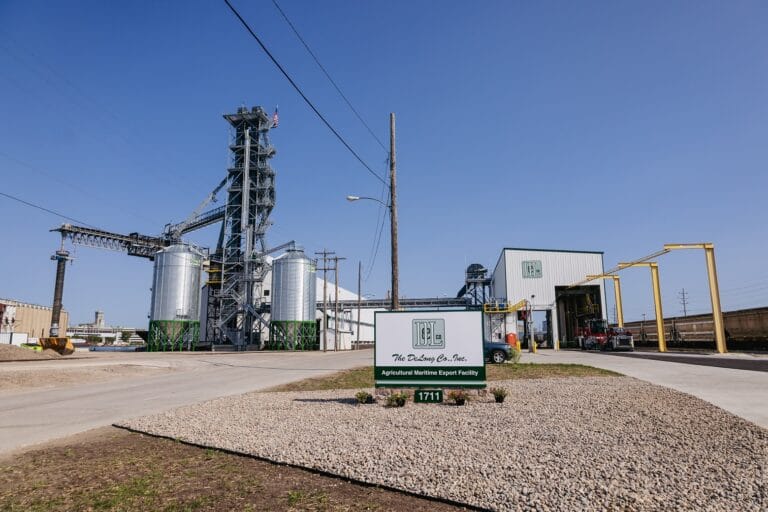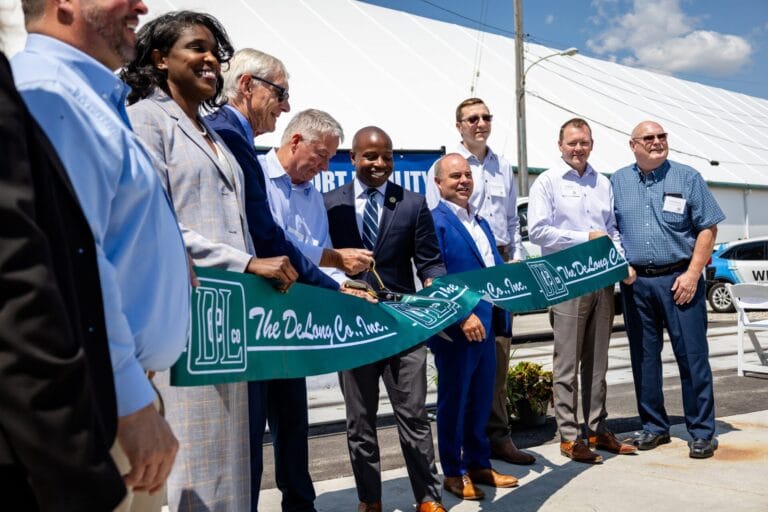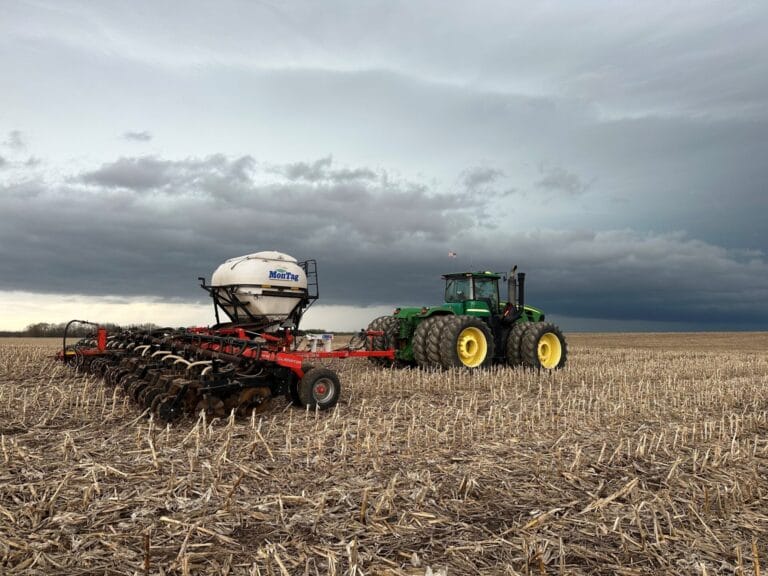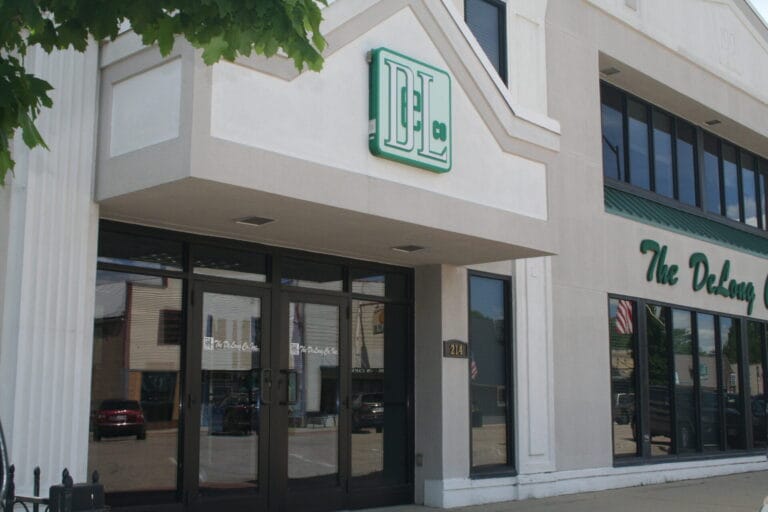1913
For over 110 years, the DeLong family has been serving the agricultural community of southern Wisconsin. Our business began with brothers William and Jesse DeLong, who along with John B. Johnson, operated a grain and feed business in Avalon, Wisconsin sometime in the very late 1800s/early 1900s. In 1913, they began a grain operation in Darien, Wisconsin. By the late 1920s, the partnership involved Frank H. Johnson and was known as Johnson & DeLong.
1929
On June 7th, 1929, Frank H. Johnson, William E. DeLong, and Jesse DeLong purchased the G.W. Irish feed mill in Clinton, Wisconsin. The Johnson & DeLong partnership thus began doing business in Clinton. William DeLong, Jr. (son of William E. DeLong), who had been sales manager for Sterling Oil Co. in Milwaukee, Wisconsin and started his own lube oil business, moved to Clinton in 1929 to manage the Clinton Feed Mill for Johnson & DeLong. The old mill was moved south to the C & NW railroad tracks and a new combination grain elevator and feed mill was constructed on the site of the old mill (southwest corner of Front St. and Durand St.). At the time of construction, this was the largest elevator/feed mill combination structure in the state of Wisconsin.
1933
Frank H. Johnson deceased September 18, 1932 and in the settlement of his estate, William E. DeLong and Jesse DeLong purchased the entire Clinton feed mill on April 7th, 1933 and sold their interest in the Avalon mill to the Johnson estate. At this time, William DeLong, Jr. also became a partner with his father and uncle and the company name was changed to The DeLong Co. Pictured together, William Jr. and his wife, Florabelle DeLong, who was also active in the business.
1933-1939
The principal crops grown in the area at that time were hay, wheat, oats, barley, and corn. For many years during the thirties, The DeLong Co. was the largest shipper of malting barley in the state. Most of the malting barley went to the various malt houses and brewers located in Chicago, Milwaukee, and throughout Wisconsin. Another large cash crop of the era was hay, which was shipped by boxcar to Chicago and eastern points.
The feed business consisted mostly of grinding grists brought to the mill by area farmers. Salt and mineral were added at the mill as well as numerous bulky feed by-products such as wheat bran, malt sprouts, and beet pulp. The main source of protein added was linseed oil meal.
Also, in the thirties, Bowman Dairy Co. added a dried milk process to their milk receiving plant at Clinton. The DeLong Co. had a contract to take all the production of Bowman’s Clinton plant. As this technology developed, the demand skyrocketed and the Bowman Dairy Co. plant at Clinton could not produce the quantity that The DeLong Co. could sell. As many new production plants were being added by Bowman Dairy Co. and other producers, Bowman Dairy Co. desired to market the production of all its plants. The DeLong Co. sold the marketing contract back to Bowman Dairy Co. and withdrew from the dried milk business.
In the thirties, The DeLong Co. purchased wool from producers. They also cleaned a variety of seed such as clover and timothy as well as handled coal, the principal heating fuel of the time.
The DeLong Co. (Petroleum Products) continued to market lube oil through farm equipment dealers in Minnesota, Iowa, Wisconsin, and Illinois under the StaCool and Jay-Dee brand names. The plant was in Chicago but the office was in Clinton where Florabelle DeLong, William DeLong, Jr.’s wife, was in charge.
World War II came and the direction of the The DeLong Co. changed dramatically. All products were in short supply as well as many being rationed. Looking at the shortage of wheat during World War I, the government encouraged production of wheat which soon became a surplus commodity and was sold back to farmers at a discount price if fed to livestock and not used for human consumption. So abundant was the supply of flour under government regulation that feed millers such as The DeLong Co. were required to purchases a quantity of flour in order to purchase the wheat bran by-product.
Many commodities, such as coal, were placed on a quota system and each dealer could receive only a percentage of their past purchases.
Crude oil production was completely taken over by the government and The DeLong Co. could produce only petroleum products used by the government.
1945 - 1950
The end of World War II saw another shift in agriculture and The DeLong Co. again moved to fill those needs of the farmers. Corn became the dominant cash crop in the area and feed concentrates specially formulated for various type of livestock began to be more popular as their efficiency in production became much more evident.
In 1948, The DeLong Co. constructed a new manufacturing facility on the former C & NW stockyards location and entered the feed manufacturing and wholesale feed distribution business.
1950 - 1960
A small “shipping” elevator was constructed. In addition, corn drying facilities were added to handle wet corn purchased from area farms. The only drying facilities were at terminal elevators in Chicago or Milwaukee. Increased production in the area required drying to be accomplished prior to shipment to the terminal elevators as the railroads would no longer give priority service for wet corn shipped to the terminal elevators.
In the spring of 1951, William E. DeLong and Jesse DeLong passed away April 10th and April 29th, respectively. A new partnership, consisting of William DeLong, Jr., his wife Florabelle DeLong, and their sons, William B. DeLong and Delmar E. DeLong, both pictured, was formed.
During the fifties, the feed, fertilizer and grain business of the company continued to expand. A corn storage building was added in 1957 located between the “shipping” elevator and the feed manufacturing facility with an 85,000 bushel storage capacity which raised the total grain storage capacity of the company to 130,000 bushel.
1960 - 1970
In 1961, the company leased the former Bowman Dairy Co. plant for its wholesale feed distribution warehouse.
Commercial fertilizer sales had grown tremendously since World War II as crop production in the area increased. The DeLong Co. introduced liquid fertilizer in 1957, the first in the State of Wisconsin to do so. As this business grew, a new liquid fertilizer manufacturing plant was built in 1965 located directly south of the intersection of Durand St. and Front St.
In 1966, the company lost its lease on the former Bowman Dairy Co. plant and it was sold to a pump company and the wholesale feed offices of the company were moved to their present location at the west end of Front Street.
1970 - 1980
By 1972, it became very apparent that the Front St. location was not adequate. The former Bowman Dairy Co. property was purchased from the then defunct pump company and the fertilizer manufacturing facilities were moved to that location. Some land was also purchased in the soon to be established Clinton Industrial Park and an 80,000 bushel grain bin was built in the fall of 1972.
In 1973, a new grain elevator was constructed which has since been expanded in 1977, 1982, 1986, 1992, 1999, and 2000. With the demise of the Milwaukee Rd. in Clinton, a railroad track was constructed through the Clinton Industrial Park providing rail service to the C & NW. The company began shipping 25 and 50 car unit trains in the winter of 1979-80, the first and only unit train grain shipper in Southern Wisconsin at the present time. Railroad service was the determining factor when Clinton was chosen for a location. At that time, Clinton was serving two major rail lines. The railroad is still an extremely important necessity of the company.
Pictured, a photo from the late 1970s of the Front St. location. Far left is William DeLong, Jr., second from left is William B. (Bill) DeLong, third from left is Bo DeLong, third from right is David DeLong.
1980 - 1990
A 19,250 sqft feed warehouse was constructed in the fall and winter of 1981-82 for the expanding feed lines, including pet foods, bird feeds, and wild bird feed, etc.
In 1982, the company entered into the business and process of identity preserving various types of corn and soybeans for the food industry. As the business grew and was not able to expand in Clinton at that time, the company purchased a grain elevator in Kirby, OH in 1984 to process food corn and soybeans.
In the fall of 1984, DeLco Transport, Inc. began as a separate transportation company, subsidiary of The DeLong Co., Inc. At the same times, DeLco International, Ltd., an export marketing company was established to market foreign export from both Clinton, Wisconsin and Kirby, Ohio facilities. Both were headquartered in Clinton, Wisconsin.
The company purchased the Cropmate Company fertilizer plant between Darien and Sharon in 1985 and added an anhydrous ammonia plant in Clinton in 1986. In the fall of 1987, the Bowman Fertilizer plant in Winnebago, Illinois, as well as the Cropmate Company fertilizer plant in Evansville, Wisconsin were purchased.
1990 - 2000
Further expansion in the fall of 1990 included purchase of the Terra Fertilizer location in Winnebago, Illinois as well as the Lein Oil Fertilizer facility in Janesville, Wisconsin. In 1999 and 2000, the complete cleaning operation was upgraded with new cleaning equipment. This equipment provided extra capacity and performed a better cleaning process. The company also developed and built a new roll-belt sorter for the soybean cleaning process. This sorter was one of only 6 in the United States that separates splits out of round soybeans. Again, the goal of these investments was to improve the quality of the products offered to customers.
2000 - 2010
More recent expansions included the building of a new birdseed mixing plant at the Clinton facility, as well as the acquisition of a retail store in Illinois and the Hintzsche grain elevators and Stade grain elevators. By 2007, the grain division had grown significantly to become the largest containerized agricultural shipper in the country, and a major supplier of food grade corn and soybeans worldwide. Over the next 15 years, the company added a soybean handling facility to the Clinton location, expanded operations and opened locations across the country and invested in a new seed treatment system in Clinton.
2010 - 2020
In 2013, the company celebrated the groundbreaking of a grain transloading export facility in Edgerton, Kansas, at the Logistics Park-Kansas City.
In 2014, the company purchased Racine Grain, expanding grain and fertilizer operations to the Union Grove area.
In 2016, the company purchased the Gavilon Grain elevator in Avalon, Wisconsin.
In 2018, the agronomy division expanded with the acquisition of Helena Agri-Enterprises LLC’s agronomy assets in Avalon and Elkhorn, Wisconsin.
In 2019, the grain division added seven elevator locations with the purchase of the Demeter LP and Seegers Grain Operations.
In 2020, the company acquired grain facilities in New York.
2021
In early 2021, a new full-scale seed warehouse and bulk seed facility was completed in Clinton.
In fall 2021, a groundbreaking was held in Milwaukee, for the new DeLong agricultural maritime export facility.
2023
In July 2023, we celebrated the grand opening of our new agricultural maritime facility- the first of its kind on the Great Lakes. The facility was made possible by local, state and federal grants and partnerships. In summer and early fall 2023 the facility loaded its first two bulk vessels.
Other improvement in 2023 include the wholesale bird seed plant undergoing a major redesign of the bagging and palletizing line.
Our Joliet facility completed a major renovation of their bagging line capabilities.
In spring and summer 2023, the Elkhorn agronomy facility began construction of a major fertilizer facility overhaul, to include both dry and liquid services.
Current Operations and Achievements
Still headquartered in Clinton, WI, the company currently operates 38 facilities and offices in Wisconsin, Illinois, Kansas, Nebraska, New Jersey, New York and Ohio. The company operates six divisions: Agronomy, Seed, Grain, Exports, Transport and Wholesale. Additional subsidiaries and divisions include DeLong Organics, Direct Transport, ContainerParking.com, Yield365, Grown Climate Smart, and DeLco Crop Insurance.
The DeLong Co. is the #1 U.S. exporter of containerized agricultural products, according to the 2023 Journal of Commerce export rankings. The company ranked #3 overall in total U.S. container exports for the same year.
The DeLong Agronomy division has been recognized in Farm Chemical Magazine as one of the nation’s top 100 dealers since annual listing started in 1985.
The DeLong Co. has been included annually in Deloitte’s list of the Wisconsin75, a ranking of top privately-owned businesses in Wisconsin based on revenue. The DeLong Co., Inc. was recognized with Deloitte’s “Generations” Distinguished Performer Award in 2012. In September 2023, the company ranked #25 on Deloitte’s Wisconsin75 list.
Family Involvement
For six generations, our family members have grown up working alongside siblings and cousins in the company. For many of us, the family business was a first job in middle school or high school. Through the last 50+ years, many DeLong family members and spouses have worked at the company at some point in their lives. Below are the individuals who have been primarily active in the business from each generation.
2nd Generation
Florabelle DeLong, wife of William DeLong Jr., who served as an owner and vice president, respectively, became inactive in the company in 1966 due to illness and deceased on May 12, 1979.
William DeLong, Jr. deceased January 9th, 1982 after an accident and brief illness, having spent 53 years with the company, the last 31 years as its chief managing partner and later president. The couple had two sons, both of whom worked in the family business.
3rd Generation
William B. DeLong, after his return from the Army in 1950, joined the company and guided the company through much of its growth in the grain and liquid fertilizer business. He suffered a series of heart attacks and strokes commencing April 15, 1975 and retired in 1982 to De Leon Springs, Florida. He deceased on January 16, 1992.
Delmar E. DeLong started with the company after his return from the Army in 1955. He left to practice law in 1966 and served in the Wisconsin State Assembly from 1970-1982. Upon his father’s death in 1982, he returned to serve as president until his retirement in 1994 to Ocala, Florida. He deceased June 30, 1999.
4th Generation
William C. (Bo) DeLong, son of William B., started full-time in 1974 working in the fertilizer division. In 1982, he became head of the grain division and currently serves as Vice President of Grain.
David D. DeLong, son of Delmar, started full-time in 1975 working in the fertilizer division. In 1982, he became head of the fertilizer division and served as CEO/President from 1995 to 2022; he currently serves as Vice President of Agronomy.
Charles (Chick) DeLong, son of William B., started full-time in 1977 working in the grain division and later in the feed division. In 1982, he became head of the feed division and currently serves as Vice President of Wholesale. He also is head of DeLco Transport.
Daniel (Dan) DeLong, son of Delmar, started full-time in 1977 in the feed division and served as the manager of DeLco Transport and on the board of directors until 2009. Dan deceased January 2010.
Jesse (Jay) DeLong, son of William B., started full-time in 1981 in the feed division and later grain division. He served on the board, safety board and in the feed division until his retirement in 2023.
Robert (Bob) DeLong, son of Delmar, was elected to the board in 2008 and served until 2022.
Peggy (DeLong) Peissig, daughter of William B., was elected to the board in 2008 and served until 2021.
5th Generation
Christopher (Chris) R. DeLong, son of Bo DeLong, was elected to the board in 2019. Chris has been with the company full-time since 2011 in the grain division. He was named President in 2023; Christopher currently serves as CEO/President and Treasurer of the board.
William (Pat) DeLong, son of Bo DeLong, was elected to the board in 2019. Pat has been with the company full-time since 2002 in the grain division. He currently serves as Vice President of Operations and Secretary of the board.
Jordan G. DeLong, son of Chick DeLong, was elected to the board of directors in 2021. Jordan has worked full-time in the agronomy division of the company since 2011 and is the agronomy sales manager.
Whitney (Peissig) Thome, daughter of Peggy Peissig, was elected to the board of directors in 2021.
Austin P. DeLong, son of Jay DeLong, was elected to the board of directors in 2022. Austin has been with the company full-time since 2013 and is a senior export sales manager with the export division.
Erin E. DeLong Hamburg, daughter of David DeLong, has been with the company full-time since 2003. She is head of marketing communications and PR.
Benjamin (Ben) DeLong, son of Jay DeLong, has been with the company full-time since 2013. He is the Elkhorn agronomy facility manager.
Eric DeLong, son of Jay DeLong, has been with the company full-time since 2015. He is head of merchandising in the grain division.
Gabe Burke, son-in-law of David DeLong, has been with the company since 2007. He is head of IT and software development.
Emily DeLong, daughter-in-law of Charles DeLong, has been with the company since 2023. She is an agent in the DeLco Crop Insurance division.
6th Generation
The DeLong Co., Inc. is family-owned by 4th, 5th and 6th generation direct descendants of William E. DeLong. Our oldest 6th generation family members participate with summer internships and meetings to gain experience in the company.
Board of Directors of The DeLong Co., Inc.
Christopher DeLong, President and Treasurer of the Board
Pat DeLong, Vice President of Operations and Secretary of the Board
David DeLong, Vice President of Agronomy
Bo DeLong, Vice President of Grain
Chick DeLong, Vice President of Wholesale
Jordan DeLong
Whitney (Peissig) Thome
Austin DeLong
Brandon Bickham

